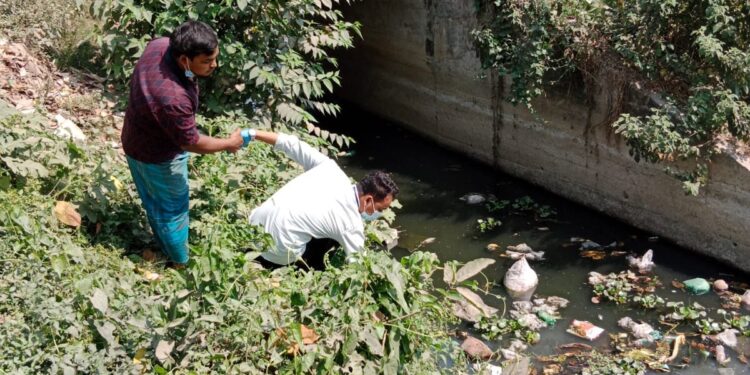Wastewater sampling. Credit: Hooda et al, CC-BY 4.0, creativecommons.org/licenses/by/4.0/
Researchers can precisely track where typhoid cases are highest by monitoring environmental samples for viruses called bacteriophages that specifically infect the bacteria that causes typhoid. Senjuti Saha of the Child Health Research Foundation in Bangladesh and colleagues report these findings in a study published in Tropical diseases neglected by PLOS.
Typhoid fever is a common infection in many low- and middle-income countries and causes approximately 135,000 deaths and 14 million infections worldwide each year. The World Health Organization has shortlisted two typhoid vaccines, but for policymakers to plan effective vaccination strategies, they need accurate, high-resolution estimates of where the burden is highest.
Traditionally, people grew the bacteria that causes typhoid fever from blood samples to determine where the infection is most common, but in the new paper, researchers tried a more cost-effective surveillance approach. They tested environmental water samples from sewage and other locations for bacteriophages specific to the waterborne pathogen that causes typhoid fever, Salmonella Typhi.
The team tested 303 water samples from two locations in Bangladesh: the urban capital, Dhaka, and a rural district, Mirzapur. They found that Salmonella typhi-specific bacteriophages were present in 31% of environmental samples from Dhaka, compared to only 3% of samples from Mirzapur. This matches the results of more than 8,400 blood cultures, in which 5% of cultures from Dhaka and 0.05% from Mirzapur tested positive.
The new results suggest that detection of Salmonella typhi-specific bacteriophages could provide a rapid environmental monitoring method that could help policymakers understand the presence of typhoid fever in the community. The researchers propose that environmental bacteriophage monitoring could be a simple, cost-effective and scalable tool to aid policy decisions regarding typhoid control.
The authors add: “Testing wastewater for bacteriophages is an inexpensive method to identify typhoid hotspots without performing costly blood cultures on thousands of people. »
More information:
Hooda Y, Old tools, new applications: Use of environmental bacteriophages for typhoid surveillance and vaccine impact assessment, PLoS Neglected tropical diseases (2024). DOI: 10.1371/journal.pntd.0011822
Provided by the Public Science Library
Quote: Environmental monitoring offers an inexpensive tool for typhoid fever surveillance (February 15, 2024) retrieved February 15, 2024 from
This document is subject to copyright. Apart from fair use for private study or research purposes, no part may be reproduced without written permission. The content is provided for information only.



